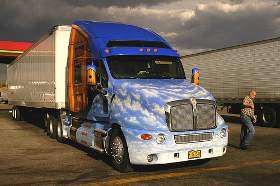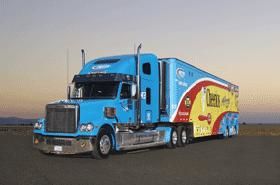Driving With A Dog.
Topic 26978 | Page 1
So you are basically looking for a way to "put one over" on a company, by sneaking onboard a pet that falls outside of their restrictions?
There are a number of reasons why companies have these restrictions. Larger dogs tend to do more damage (wear and tear) on their equipment. If you owed the equipment, would you rather have a 15 lb dog, or a 100 lb dog running around in your truck?
The other one is "potential liability". Larger breed dogs (like the evil pitbulls, rotties, dobies, etc.) have the potential to do more damage to PEOPLE - leaving the company open to financial liability if a dog THEY ALLOWED to ride with an employee got into an incident. Just as a homeowner gets sued for something their dog does, a TRUCK OWNER (the company) could be likewise liable. Many insurance companies will not write a homeowner policy if you own a certain breed.
I've always had Rottweilers - sweetest dogs on the planet (for all their fierce reputation) - and have been refused a lease renewal in a rental, because the landlords insurer would not write a liability policy if that breed resided there. We're all acquainted with the fact that many of the large breed dogs with horrible reps are not the breed themselves, but irresponsible owners. And while genetics do play a part, especially with lines that are bred specifically for aggressiveness - it is STILL HOW THEY ARE RAISED AND TRAINED. I have friends that think all pitbulls should be shot - and friends that own them and they're the loving most sweetest animals on the planet.
But back to the original premise of the question. Telling your company you have a poodle, and bringing your pitbull - and GETTING CAUGHT DOING SO - would likely be a VIOLATION OF COMPANY POLICY that could result in your TERMINATION.
One of the things (of the many things) that keep blocking me from going OTR - is my dog. Good luck finding a company that will allow a 90b Rottie, and good luck to me trying to get her in and out of a cab.
For you - find a company that doesn't have a size restriction on pets, or consider LEAVING THE PET HOME. "Putting one over" on the company is NOT A GOOD IDEA...
Rick
OTR:
Over The Road
OTR driving normally means you'll be hauling freight to various customers throughout your company's hauling region. It often entails being gone from home for two to three weeks at a time.
EPU:
Electric Auxiliary Power Units
Electric APUs have started gaining acceptance. These electric APUs use battery packs instead of the diesel engine on traditional APUs as a source of power. The APU's battery pack is charged when the truck is in motion. When the truck is idle, the stored energy in the battery pack is then used to power an air conditioner, heater, and other devices

Rick wrote exactly what I was thinking...this statement stand-out for me...
Rick wrote this to DC:
and GETTING CAUGHT DOING SO - would likely be a VIOLATION OF COMPANY POLICY that could result in your TERMINATION.
Violation of Company Policy that results in Termination; ...is one of those things that will absolutely impede future employment opportunities. For reasons that should be very obvious, trucking companies want drivers who are trustworthy. Fact.
HOS:
Hours Of Service
HOS refers to the logbook hours of service regulations.My guess is that many wouldn't notice ..... until it becomes a problem. At that point "failure to obey company policy" goes on your DAC. According to Prime HR, that line prevents tons of people from getting hired at Prime.
Have an accident or DOT inspection?
it may be on the police report. It is the law to produce the rabies records to an officer if asked. I have been inspected 4 times and twice they placed "small pet 9 to 15 lbs vaccine confirmed" on my inspection report. Vaccine are given in weights for dosage. Would.someone catch "large pet 60 to 80 pounds"? idk.
Need to go into the shop? I am finding out that many companies require you get repaired ONLY at their terminals unless needing a tow. If the company forbids German Sheppards, chances are it will be noticed by a mechanic.
There are some companies way more lenient with the weight. I would find one of them.
Terminal:
A facility where trucking companies operate out of, or their "home base" if you will. A lot of major companies have multiple terminals around the country which usually consist of the main office building, a drop lot for trailers, and sometimes a repair shop and wash facilities.
DOT:
Department Of Transportation
A department of the federal executive branch responsible for the national highways and for railroad and airline safety. It also manages Amtrak, the national railroad system, and the Coast Guard.
State and Federal DOT Officers are responsible for commercial vehicle enforcement. "The truck police" you could call them.
DAC:
Drive-A-Check Report
A truck drivers DAC report will contain detailed information about their job history of the last 10 years as a CDL driver (as required by the DOT).
It may also contain your criminal history, drug test results, DOT infractions and accident history. The program is strictly voluntary from a company standpoint, but most of the medium-to-large carriers will participate.
Most trucking companies use DAC reports as part of their hiring and background check process. It is extremely important that drivers verify that the information contained in it is correct, and have it fixed if it's not.
TWIC:
Transportation Worker Identification Credential
Truck drivers who regularly pick up from or deliver to the shipping ports will often be required to carry a TWIC card.
Your TWIC is a tamper-resistant biometric card which acts as both your identification in secure areas, as well as an indicator of you having passed the necessary security clearance. TWIC cards are valid for five years. The issuance of TWIC cards is overseen by the Transportation Security Administration and the Department of Homeland Security.
I thought about this one when I was considering bringing a Bassett Hound with me. 40 pound weight limit but her fat butt was 49 pounds. I didnt bring her just in case.

Also remember, the larger the dog the smaller the space is for them. I brought my 40pd pit and she was a bit cramped imo.
Also, I would suggest getting a membership at the petsmart clinic cause it's hard to find a vet that is convenient for a big truck. Good luck.

The majority of businesses I frequent will not allow pets on their property. You get caught, you may get banned. Leave the pets at home. Only way I would put a dog in the truck is if the rates were fantastic and I was not under the gun to deliver the load along with plenty of screwing around time built in so the animal could be properly cared for. I have never had steady work like that. Personally I would not subject any animal to living in a truck.
Wow, thanks. Great answers everyone. I know exactly what to do! My dog is about 10 to 15 pounds outside the weight limit for a company, so I guess I will find a company that doesn't care, or I will find another career since I'm single and have no one to care for me dog but me!
Thanks again for the thoughtfulness and time you all take in answering questions.
I believe Will-Trans and Jim Palmer have a liberal pet policy
Understand this, too - no one will rat you out faster than drivers at your own company. If the policy says no dogs over 40 pounds, your company will have dozens or even hundreds of drivers that would love to have their big dog with them but don't because of the policy. If they see you with a dog that doesn't conform to the policy, they'll rat you out in a heartbeat. They figure if they can't have theirs on the truck, neither should you.
If a dog is overweight by 5 or 10 pounds, no one is going to notice or put the dog on a scale. But if the dog is obviously much larger than policy allows, someone will report it.
Check this out:
New Reply:
New! Check out our help videos for a better understanding of our forum features

















Preview:








 TT On Facebook
TT On Facebook
Hi, I have seen some of the restrictions that companies have for pets, weight restrictions, etc. My question is; How does a company actually know if your pet is over their weight restriction, and has anyone brought a pet along with them that did not fit their guidelines, by weight, etc.